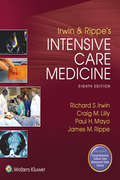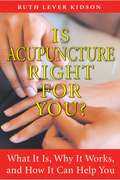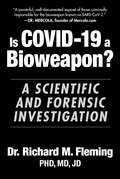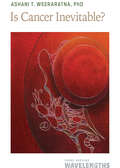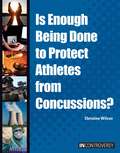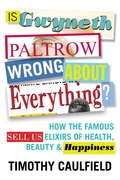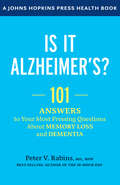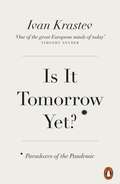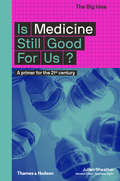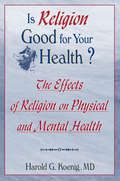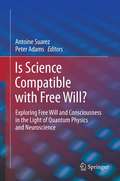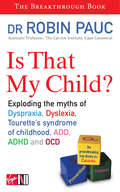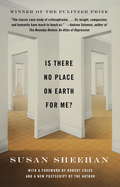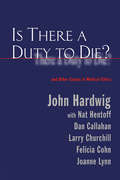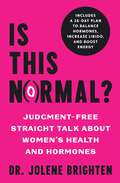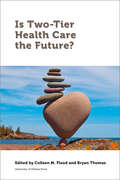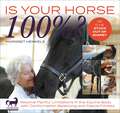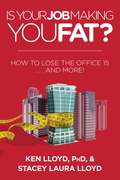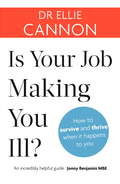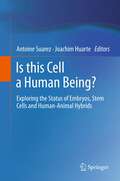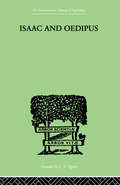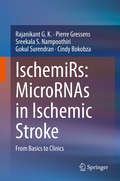- Table View
- List View
Irwin and Rippe's Intensive Care Medicine
by Richard S. IrwinWith a focus on evidence-based, state-of-the-art information throughout, the eighth edition of Irwin and Rippe’s Intensive Care Medicine offers authoritative guidance to the wide variety of specialty physicians and non-physicians practicing in the adult intensive care environment. This comprehensive textbook covers both the theoretical and practical aspects of the field, and has been completely updated to provide encyclopedic, interprofessional coverage to support practitioners in every area of this complex field.
Is Acupuncture Right for You? What It Is, Why It Works, and How It Can Help You
by Ruth Lever KidsonIs Acupuncture Right for You? is regarded by many practitioners as the most concise and useful book to introduce prospective patients to the principles, processes, and benefits of acupuncture.
Is Anyone Listening?: Accountability and Women Survivors of Domestic Violence
by Gill Hague Audrey Mullender Rosemary ArisDomestic violence is in the public eye as never before, but how often are abused women consulted or involved in the new services and policies? This book investigates, and reveals that the voices of survivors of domestic violence are often simply not heard; silenced, the women themselves become invisible. Is Anyone Listening? draws on the experiences of other service user movements to provide a strong conceptual framework for thinking about abused women's participation in policy and service development. It discusses empowerment issues and the women's movement against gender violence, exploring how far refuge organisations and other women's movement services have influenced statutory services and vice versa. It includes many practical ideas for involving women in the improvement of both policy and practice and gives examples of inspiring and innovatory projects.Based on a study carried out as part of the Economic and Social Research Council's Violence Research Programme, Is Anyone Listening? offers a unique analysis of the sensitive and complex issues involved in developing service user participation within the domestic violence field. The insights it provides will enable policy-makers, activists, students, practitioners and women who have experienced domestic violence to move forward together.
Is COVID-19 a Bioweapon?: A Scientific and Forensic investigation
by Dr. Richard M. FlemingWhat is the true origin of COVID-19? President Joe Biden has ordered US intelligence agencies to further investigate the origins of COVID-19. Clearly, the US government isn't decided on what really happened at the start of the pandemic. Was it truly a animal to human transmission to be blamed on a bat in a Wuhan, China wet market? Or was a much more sinister plan at work? In 2020, Dr. Richard M. Fleming began investigating SARS-CoV-2/COVID-19. Using both his "Inflammation" Theory and Patent (FMTVDM; the first method capable of measuring regional blood flow and metabolic changes occurring inside the body, which makes it possible to accurately determine what is happening inside the body as well as whether treatments prescribed for patients are working or not), he investigated COVID treatments. Simultaneously he began investigating the origins of COVID-19. This book details much of what he has found. What he discovered will shock you. By 1999, US Federal Agencies began funding Gain-of-Function research. Research that by its very nature is designed to increase the ability of pathogens to infect and harm people. In 2019, one of those pathogens was intentionally released upon the world in the Wuhan Wet Market. The key to proving and understanding this bioweapon is its spike protein. The very same spike protein now being made in millions of people after the COVID vaccines are injected into them. These vaccines are nothing more than the genetic code of this bioweapon. This book traces the publication and money trail of COVID-19; showing who is ultimately criminally responsible for the design and development of this weapon, which violates the Biological Weapons Convention (BWC) Treaty, exposing those who have committed crimes against humanity. Dr. Fleming will reveal the ultimate conspiracy: one that puts the future of the entire world at stake.
Is Cancer Inevitable? (Johns Hopkins Wavelengths)
by Ashani T. WeeraratnaHow can new understandings about cancer cell interactions help doctors better control, and eventually cure, cancer?Cancer is a formidable enemy. In fact, people born in America since 1960 face a one in two chance of being diagnosed with cancer in their lifetimes. However, there's growing evidence that fewer cancers will be death sentences for patients. New approaches and understandings are transforming the medical world, increasing success rates for remissions, disease management, and cures. Dr. Ashani Weeraratna is at the forefront of this new level of care. In Is Cancer Inevitable?, Weeraratna—a pioneering melanoma researcher whose work explores the role aging plays in cancer cells' spread and drug resistance—gives readers an inside look at several of the latest cancer advances. Detailing the actions that are reducing the disease's impact and exploring what the future may hold, she explains how the molecular mechanisms involved in metastasis and the cells' microenvironments influence cancer's development and progression. Over the years, she writes, our understanding of how cancer cells move throughout the body, change as they plant themselves in the body's microenvironments, and even communicate with one another have led to major insights about how cancer works. With compelling detail, she takes us inside her lab, revealing how new insights are leading to major breakthroughs, even among patients with Stage IV cancer. She also explains how age-related changes in the microenvironment contribute to multiple aspects of melanoma formation and development. Such scholarship, she argues, is moving us toward a day when more patients will be declared cancer-free. An inspiring and deeply personal book, Is Cancer Inevitable? offers readers newfound hope.Features• Explores key insights and studies developed in recent years that have greatly influenced the world of cancer research, including how aging microenvironments within our bodies encourage metastasis and therapy resistance• Guides readers through Dr. Ashani Weeraratna's personal story of coming to the United States from Lesotho at the age of 17 and rising to become one of the pioneers in her field• Brings readers inside Weeraratna's lab, describing both the processes and the missions of her work • Raises awareness about how cancer works within the body and what any patient or family encountering the disease needs to understand—while also offering them hope based on new and forthcoming diagnostic and treatment methods• Outlines why we will never control—let alone cure—cancer if we don't find a common purpose and come together in collaboration, inviting the greatest minds from around the world to participate in finding and implementing solutionsJohns Hopkins WavelengthsIn classrooms, field stations, and laboratories in Baltimore and around the world, the Bloomberg Distinguished Professors of Johns Hopkins University are opening the boundaries of our understanding of many of the world's most complex challenges. The Johns Hopkins Wavelengths book series brings readers inside their stories, illustrating how their pioneering discoveries benefit people in their neighborhoods and across the globe in artificial intelligence, cancer research, food systems' environmental impacts, health equity, science diplomacy, and other critical arenas of study. Through these compelling narratives, their insights will spark conversations from dorm rooms to dining rooms to boardrooms.
Is Enough Being Done To Protect Athletes From Concussions?
by Christine WilcoxExperts estimate that at least 10 percent of all contact sports athletes sustain concussions every year. Through objective discussion, numerous direct quotes, and full-color illustrations this title examines What Are the Origins of the Concussion Controversy in Sports? How Dangerous Are Concussions? Are Adult Leagues Doing Enough to Protect Players? Are Schools and Youth Leagues Doing Enough to Protect Kids? Who Is to Blame for Concussion Risks to Athletes?
Is Gwyneth Paltrow Wrong About Everything?
by Timothy CaulfieldAn exploration of the effect our celebrity-dominated culture has on our ideas of living the good life What would happen if an average Joe tried out for American Idol, underwent a professional makeover, endured Gwyneth Paltrow's "Clean Cleanse," and followed the outrageous rituals of the rich and famous? Health law policy researcher Timothy Caulfield finds out in this thoroughly unique, engaging, and provocative book about celebrity culture and its iron grip on today's society. Over the past decade, our perceptions of beauty, health, success, and happiness have become increasingly framed by a popular culture steeped in celebrity influence and ever more disconnected from reality. This isn't just a hyperbolic assertion. Research tells us that our health decisions and goals are influenced by both celebrity culture and celebrity endorsements, our children's ambitions are now overwhelmingly governed by the fantasy of fame, and the ideals of beauty and success are mediated through a celebrity-dominated worldview. But while much has been written about the cause of our obsession with the rich and famous, Caulfield argues that not enough has been done to debunk celebrity messages and promises about health, diet, beauty, or the secret to happiness. From the obvious dangers, to body image of super-thin models and actors, or Gwyneth Paltrow's enthusiastic endorsement of a gluten free-diet for almost everyone, or Jenny McCarthy's ill-informed claims of the risks associated with vaccines, celebrity opinions have the power to dominate our conversations and outlooks on our lives and ourselves. As marketing and social media bring celebrities and their admirers ever closer, celebrity status and lifestyle has become a seemingly more realistic and obtainable goal. Being famous has become the main ambition of an increasing number of average citizens, above being kind, successful, or loved. The celebrity brand is at once the most desired state of being (modern day royalty!) and one of the most socially problematic. Caulfield provides an entertaining look into the celebrity world, including vivid accounts of his own experiences trying out for American Idol, having his skin resurfaced, and doing the cleanse; interviews with actual celebrities; thought-provoking facts, and a practical and evidence-based reality check on our own celebrity ambitions.From the Hardcover edition.
Is It Alzheimer's?: 101 Answers to Your Most Pressing Questions about Memory Loss and Dementia (A Johns Hopkins Press Health Book)
by Peter V. RabinsA medical expert answers your common questions about memory loss, causes of dementia, diagnosis, prevention, treatment, and more.Perhaps someone in your family has been diagnosed with Alzheimer disease—or maybe you worry about developing memory loss yourself. In Is It Alzheimer's?, Dr. Peter V. Rabins, a top expert in the field, educates readers by answering 101 often-asked questions about memory loss and dementia.Written in a conversational, easy-to-use Q&A style, the book is organized into seven unique sections. A companion to the best-selling The 36-Hour Day, which Dr. Rabins coauthored, this book discusses• how to distinguish typical memory loss from early dementia• how dementia is diagnosed• what factors play a role in the progression of dementia• whether it's possible to lower your risk of developing Alzheimer disease or dementia• how to improve the quality of life of people with dementia• how to assess long-term care facilities and nursing homes• available treatments, including medication• how to explain the symptoms of Alzheimer disease and dementia to others• how to provide caregivers with psychological and emotional support• and much moreAimed at friends and family members of the estimated 5.1 million US adults with dementia, as well as adults who are concerned about developing dementia, the book offers helpful directions and comfort. Is It Alzheimer's? is a quick, accessible, and essential reference for anyone who hopes to navigate the confusion of dementing illnesses.
Is It Me or My Meds: Living with Antidepressants
by David A. KarpThis book gives voice to those who are depressed and to those who use medications so that they are not depressed. Full of useful information.
Is It Tomorrow Yet?: Paradoxes of the Pandemic
by Ivan KrastevA FINANCIAL TIMES BOOK OF THE YEAROne of our most scintillating public intellectuals explores the political paradoxes of the pandemic and helps us think our way through it'We are able to imagine anything because we are being besieged by something that was considered unimaginable...'Beneath the panic and bluster, beneath the confusing speeches and the conflicting advice, the Coronavirus pandemic acted, changing our world in the most profound ways. The tragic human cost and the economic devastation will be assessed and calculated for decades to come. But the pandemic also changed things in ways that are less easily expressed and understood. It has made bare the frayed contradictions of modern life. It has distorted things that seemed simple and settled. It has affirmed plain, uncomfortable truths. In this brilliant, thought-provoking essay, Ivan Krastev, one of our most interesting thinkers today, explores the pandemic's immediate consequences and conceives of its long-term legacy. Will things be different for the communities most harmed, and for those who escaped the worst? Where are we now with the US and China, with the UK and Europe? And how do we think our way through the unthinkable?
Is Medicine Still Good for Us?: A Primer For The 21st Century (The Big Idea Series #0)
by Julian SheatherThis fascinating entry in The Big Idea series lays out the ethical implications and the costs of modern medicine. Over the course of human history, medicine has achieved incredible successes—but at what cost? This latest book in The Big Idea series explores the state of modern medicine, examining the ethics of medical and healthcare practices and the impact they have on modern life. This fascinating analysis engages with the debate surrounding the escalating costs, both financial and ethical, of medicine today. Intelligent and provocative, Is Medicine Still Good for Us? dissects common assumptions about medicine, helping the reader create their own informed opinion about its extraordinary achievements, limitations, injustices, and inevitable failures. Dr. Julian Sheather, an ethics adviser to Doctors Without Borders, contextualizes medicine as a science, art, institution, and ideology, outlining the pros and cons of what medicine has become in the signature Big Idea textual approach. Accompanying Sheather’s text are numerous informative illustrations that deepen the reader’s understanding of the material. A timely addition to the series, this book will engage those who love to debate, who are interested in ethics and philosophy, and those working in the medical field.
Is Religion Good for Your Health?: The Effects of Religion on Physical and Mental Health
by Harold G KoenigIs Religion Good for Your Health? takes you deep into the heart of the ageless debate on the importance of religion and faith to physical and mental health. On the one hand, you will learn about important research findings from cross-sectional, longitudinal, and intervention studies that have demonstrated positive effects of religious belief on both mental and physical health. On the other hand, you will learn how the vast clinical experiences of leading health experts suggest that religion can have negative effects on health. Integral to the book’s exploration of the relationship between health and religion are the trends that have occurred in society over the last century. You will learn about significant demographic changes, changes in health and health care, and shifts in values, attitudes, and religious conviction, all of which have direct implications for health care providers, the clergy, the “baby boomers,” and older adults. From Author Harold Koenig, a leading expert on religion and health who has frequently been interviewed by major broadcasting networks such as ABC, National Public Radio, the British Broadcasting Corporation, NBC, CBS, and “Ivanhoe Broadcast News,” you will also learn about: pathological uses of religion the need for cooperation and collaboration between health and religious professionals studies on the relationship of religious beliefs and practice to physical conditions such as blood pressure, heart disease, stroke, and cancer links between religious behavior and depression, anxiety, and drug use the waning of religion’s influence in America first-hand accounts from patients who have faced painful and/or life-threatening illnessAs Is Religion Good for Your Health? analyzes the pathological aspects of religion, you will begin to understand how religious beliefs have the capacity to strongly influence people’s lives and their health, whether positively or negatively. Health care providers, public policy experts, religious professionals, medical researchers, and medical students will find the book’s overview of the issues at stake, particularly the implications for our public health care system, crucial to the advancement of health care practice into the next century.
Is Science Compatible with Free Will?
by Antoine Suarez Peter AdamsAnyone who claims the right 'to choose how to live their life' excludes any purely deterministic description of their brain in terms of genes, chemicals or environmental influences. For example, when an author of a text expresses his thoughts, he assumes that, in typing the text, he governs the firing of the neurons in his brain and the movement of his fingers through the exercise of his own free will: what he writes is not completely pre-determined at the beginning of the universe. Yet in the field of neuroscience today, determinism dominates. There is a conflict between the daily life conviction that a human being has free will, and deterministic neuroscience. When faced with this conflict two alternative positions are possible: Either human freedom is an illusion, or deterministic neuroscience is not the last word on the brain and will eventually be superseded by a neuroscience that admits processes not completely determined by the past. This book investigates whether it is possible to have a science in which there is room for human freedom. The book generally concludes that the world and the brain are governed to some extent by non-material agencies, and limited consciousness does not abolish free will and responsibility. The authors present perspectives coming from different disciplines (Neuroscience, Quantumphysics and Philosophy) and range from those focusing on the scientific background, to those highlighting rather more a philosophical analysis. However, all chapters share a common characteristic: they take current scientific observations and data as a basis from which to draw philosophical implications. It is these features that make this volume unique, an exceptional interdisciplinary approach combining scientific strength and philosophical profundity. We are convinced that it will strongly stimulate the debate and contribute to new insights in the mind-brain relationship.
Is That My Child?
by Dr Robin PaucAt least one child in five experiences some form of learning difficulty, but:* Learning difficulties as we understand them DO NOT exist* They are not diseases just symptoms* These symptoms never appear alone* They are treatable and avoidableDr Robin Pauc, an expert in child neurology, approaches learning difficulties, including Dyslexia, ADD, OCD, ADHD, Dyspraxia and Tourette's syndrome of childhood, from a truly ground-breaking perspective. All human babies are born prematurely and develop special new brain cells four months after birth. Every human's developement in the womb and particularly in these early stages of life can, therefore, be affected by devlepement delay, which can blight childhood and marginalize a child at school. Since our brains continue to grow, however, the symptoms can also be treated.Is That My Child? Explains the backround to human developmental delay and contains:* Advice on how to get the best assessment for your child and an explanation of what the examination must include* The effects - good and bad - of certain foods on the brain* Excercises and computer programs that you can use to expand your child's neural function* Case histories of children on whom this plan has workedIn the single biggest breakthorough in the history of learning difficulties, Is That My Child? explains the cause of Development Delay Syndromes, uses simple, easy-to-follow tips to show you how to greatly reduce the risk of your child suffering, and gives advice on what can be done to treat those children that do.
Is There No Place on Earth for Me
by Robert Coles Susan SheehanThis renowned journalist's classic Pulitzer Prize winning investigation of schizophrenia--now reissued with a new postscript--follows a flamboyant and fiercely intelligent young woman as she struggles in the throes of mental illness."Sylvia Frumkin" was born in 1948 and began showing signs of schizophrenia in her teens. She spent the next seventeen years in and out of mental institutions. In 1978, reporter Susan Sheehan took an interest in her and, for more than two years, became immersed in her life: talking with her, listening to her monologues, sitting in on consultations with doctors--even, for a period, sleeping in the bed next to her in a psychiatric center. With Sheehan, we become witness to Sylvia's plight: her psychotic episodes, the medical struggle to control her symptoms, and the overburdened hospitals that, more often than not, she was obliged to call home. The resulting book, first published in 1982, was hailed as an extraordinary achievement: harrowing, humanizing, moving, and bitingly funny. Now, some two decades later, Is There No Place on Earth for Me? continues to set the standard for accounts of mental illness.
Is There a Duty to Die?: And Other Essays in Bioethics (Reflective Bioethics)
by John HardwigFirst published in 2000. Routledge is an imprint of Taylor & Francis, an informa company.
Is This Normal?: Judgment-Free Straight Talk about Your Body
by Dr. Jolene BrightenA comprehensive and candid guide to women&’s health from naturopathic physician, bestselling author, and leader in women&’s health, Dr. Jolene Brighten.When discussing period pain or mood swings, hormonal imbalance or fertility issues, and all the &“down there&” concerns, vagina owners everywhere consistently ask their doctors one thing: Is this normal? Whether it was from her patients or her hundreds of thousands of social media followers, Dr. Jolene Brighten has heard this simple question more times than she can count. With only eighteen states (yes, really) requiring medically accurate sexual education, it&’s no wonder that so many have serious questions that need answers. In Is This Normal?, Dr. Brighten candidly shares what your sex-ed teacher should have said but didn&’t. TMI isn&’t a term in her world. She answers all those &“lady parts&” questions you&’ve always wondered but might not have felt comfortable asking, including topics as wide-ranging as the menstrual cycle, postpartum health, libido, acne, the orgasm gap, and vaginal discharges. No topic is too gross, gooey, or OMG to be off-limits. Featuring a twenty-eight-day plan to take back your cycle and dozens of charts, checklists, and diagrams that help keep it real while keeping you educated, Is This Normal? is the Our Bodies, Ourselves for the social media generation and women everywhere will benefit from this honest, easy-to-understand guide to their bodies.
Is Two-Tier Health Care the Future? (Law, Technology and Media)
by Stephen Duckett Gregory P. Marchildon Achim Schmid Fiona McDonald Stephen Thomas Bridget Johnston Sara Allin Sarah Barry Sara Burke Danielle Dawson Lorraine Frisina Doetter Noushon Farmanara Vanessa Gruben Jeremiah Hurley Martha Jackman Rachel McKay Jonathan Mullen Zeynep Or Aurélie Pierre Amélie Quesnel-Vallée David Rudoler Rikke Siersbaek Carolyn Hughes TuohyCanadians are deeply worried about wait times for health care. Entrepreneurial doctors and private clinics are bringing Charter challenges to existing laws restrictive of a two-tier system. They argue that Canada is an outlier among developed countries in limiting options to jump the queue. This book explores whether a two-tier model is a solution. In Is Two-Tier Health Care the Future?, leading researchers explore the public and private mix in Canada, Australia, Germany, France, and Ireland. They explain the history and complexity of interactions between public and private funding of health care and the many regulations and policies found in different countries used to both inhibit and sometimes to encourage two-tier care, such as tax breaks. This edited collection provides critical evidence on the different approaches to regulating two-tier care across different countries and what could work in Canada. This book is published in English.
Is Your Horse 100%?
by Margret Henkels100% ability is in your hands! Conformation Balancing is amazingly simple. With patient, conscientious placement of your hands on specific areas of the horse's body, you can bring about profound change in his physical and mental well-being. The secret? The internet-like web of fascia beneath the skin. Fascia is the connective tissue that &“holds everything together&”—it wraps around, attaches, and stabilizes muscles and internal organs, communicating with all parts, while providing structure and organization. But here's the thing: Fascia also is a reservoir for emotional trauma and tension. This means that when you help a horse find a physical release in a &“stuck&” area of strain or stiffness, you invite psychological healing, as well.
Is Your Job Making You Fat?: How to Lose the Office 15 . . . and More!
by Ken Lloyd Stacey LloydThe only thing that should be fat on your job is your paycheck. There is a "huge” worldwide obesity problem. While fads and quick-fix diets abound, they fail to address an important question in weight gain today: is your job making you fat? The answer is "Yes. ” This bold assertion is based on a great deal of global research that continues to confirm a compelling relationship between working and weight gain. The powerful link between the workplace and the waistline is due to numerous factors, including the sedentary nature of today’s jobs, the onslaught of unhealthy foods that are constantly foisted upon employees, higher levels of job stress, longer and more demanding work hours, peer pressure, new and unconventional jobs, and even more. Put it all together and you have the perfect storm for weight gain. Is Your Job Making You Fat? not only identifies and analyzes all of the central sources of weight gain associated with work, but also provides highly effective steps to control this ever-expanding problem and help you lose weight. Authors Ken and Stacey Lloyd offer a new approach where you apply your businesslike mindset and skill-set to weight management. After all, at work, you have a plan that includes objectives, benchmark dates, strategies, priorities, deadlines, and measurable results. This book shows you how to use this same methodology to take charge of your weight.
Is Your Job Making You Ill?: How to survive and thrive when it happens to you
by Dr Ellie Cannon'An incredibly helpful guide' Jonny Benjamin MBE'Groundbreaking . . . so relatable given the current way we approach our work' Amy Wall, Woman's WayWhat happens when the effects of work are far more detrimental to your wellbeing than a simple case of Sunday-night blues?Whether you're suffering from work-induced high blood pressure, depression, migraines, or panic attacks, Dr Ellie Cannon has the answer - and it's not quitting your job.We all have a moan about going to work: groaning about getting on the bus in the rush hour, counting down to the weekend. A gripe here and there is understandable and expected, but what happens when your job is making you mentally or physically unwell?When you are in this situation, it can be very difficult to know where to turn, who to speak to or where to find good quality help and advice. In Is Your Job Making You Ill?, Dr Ellie Cannon uses her decade of experience treating patients to create an essential resource for anybody suffering from job-related ill-health.Part one of the book lays out the key causes of job-related illness - from the pressure of an unmanageable workload to the challenges of an emotionally-draining job - and identifies the most common illnesses and symptoms which can occur as a result, including stress, anxiety, insomnia, high blood pressure and IBS.Part two will help you to find a way out. It includes a practical, self-directed programme that can be tailored to your individual circumstances, covering everything from where to find help, when (and if) to seek professional advice or take time off work, to micro-actions like improving your commute and adjusting your diet to support a healthy lifestyle.Work-related ill health can happen to anyone. This book is all about how to survive and thrive when it happens to you. Don't let your job rule your life anymore.
Is Your Job Making You Ill?: How to survive and thrive when it happens to you
by Ellie Cannon'An incredibly helpful guide' Jonny Benjamin MBE'Groundbreaking . . . so relatable given the current way we approach our work' Amy Wall, Woman's WayWhat happens when the effects of work are far more detrimental to your wellbeing than a simple case of Sunday-night blues?Whether you're suffering from work-induced high blood pressure, depression, migraines, or panic attacks, Dr Ellie Cannon has the answer - and it's not quitting your job.We all have a moan about going to work: groaning about getting on the bus in the rush hour, counting down to the weekend. A gripe here and there is understandable and expected, but what happens when your job is making you mentally or physically unwell?When you are in this situation, it can be very difficult to know where to turn, who to speak to or where to find good quality help and advice. In Is Your Job Making You Ill?, Dr Ellie Cannon uses her decade of experience treating patients to create an essential resource for anybody suffering from job-related ill-health.Part one of the book lays out the key causes of job-related illness - from the pressure of an unmanageable workload to the challenges of an emotionally-draining job - and identifies the most common illnesses and symptoms which can occur as a result, including stress, anxiety, insomnia, high blood pressure and IBS.Part two will help you to find a way out. It includes a practical, self-directed programme that can be tailored to your individual circumstances, covering everything from where to find help, when (and if) to seek professional advice or take time off work, to micro-actions like improving your commute and adjusting your diet to support a healthy lifestyle.Work-related ill health can happen to anyone. This book is all about how to survive and thrive when it happens to you. Don't let your job rule your life anymore.
Is this Cell a Human Being?
by Antoine Suarez Joachim HuarteThe central question of this book is whether or not particular cell entities of human origin ought to be considered human beings. The answer is crucial for making moral decisions for or against research and experimentation. Experts in the field discuss the production of embryonic-like pluripotent stem cells by altered nuclear transfer, parthenogenesis and reprogramming of adult somatic cells. They thoroughly analyse the biological and moral status of different cell entities, such as human stem cells, embryos and human-animal hybrid embryos, and make a decisive step towards establishing final criteria for what constitutes a human being. The topic is challenging in nature and of broad interest to all those concerned with current bioethical thought on embryonic human life and its implications for society.
Isaac And Oedipus: A STUDY IN BIBLICAL PSYCHOLOGY OF THE SACRIFICE OF ISAAC (International Library Of Psychology Ser.)
by Wellisch, EFirst Published in 1999. Routledge is an imprint of Taylor & Francis, an informa company.
IschemiRs: From Basics to Clinics
by Pierre Gressens Sreekala S. Nampoothiri Gokul Surendran Cindy Bokobza Rajanikant G. K.There has been an enormous increase in information relating to microRNA (miRNA) and its strategic role in numerous diseases. This book reviews the emerging role of microRNAs in cerebral ischemia, providing comprehensive details of the links between this small RNA molecule and ischemic stroke, the more prevalent of the two main types of stroke. The chapters address questions relating to microRNA’s function in various pathological features of stroke, like oxidative stress, excitotoxicity and cell death, as well as its role as a biomarker and diagnostic agent, and the current therapeutic interventions. Further, the book highlights the latest research on how miRNAs contribute to neuroregeneration following stroke, discussing the myriad computational tools and databases used in miRNA research, and decsribes how how miRNA modulates other cerebrovascular diseases. The book concludes with fresh insights into the effect of long non-coding RNA in cerebral ischemia.
